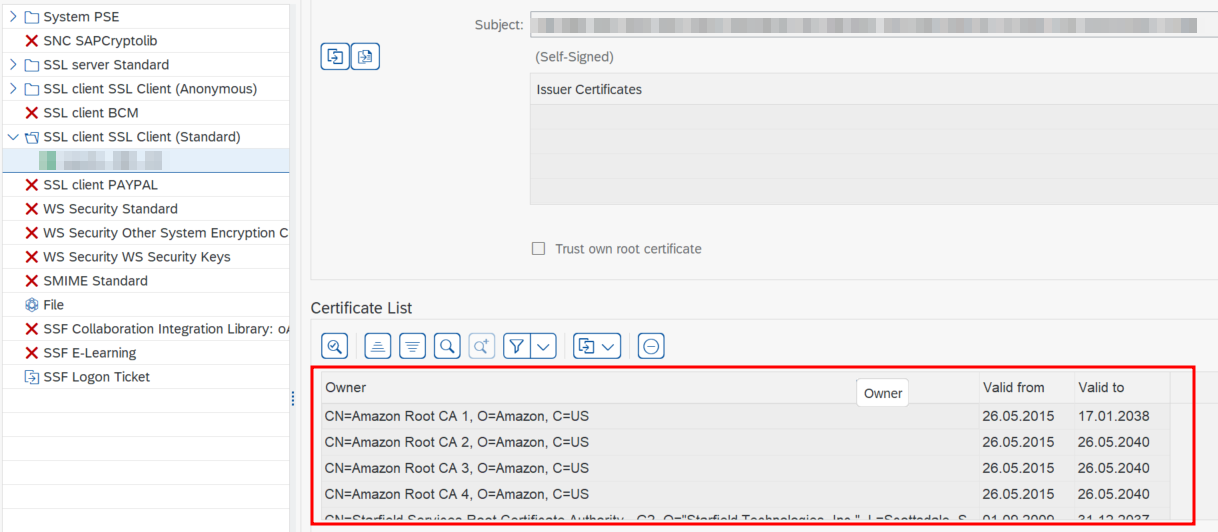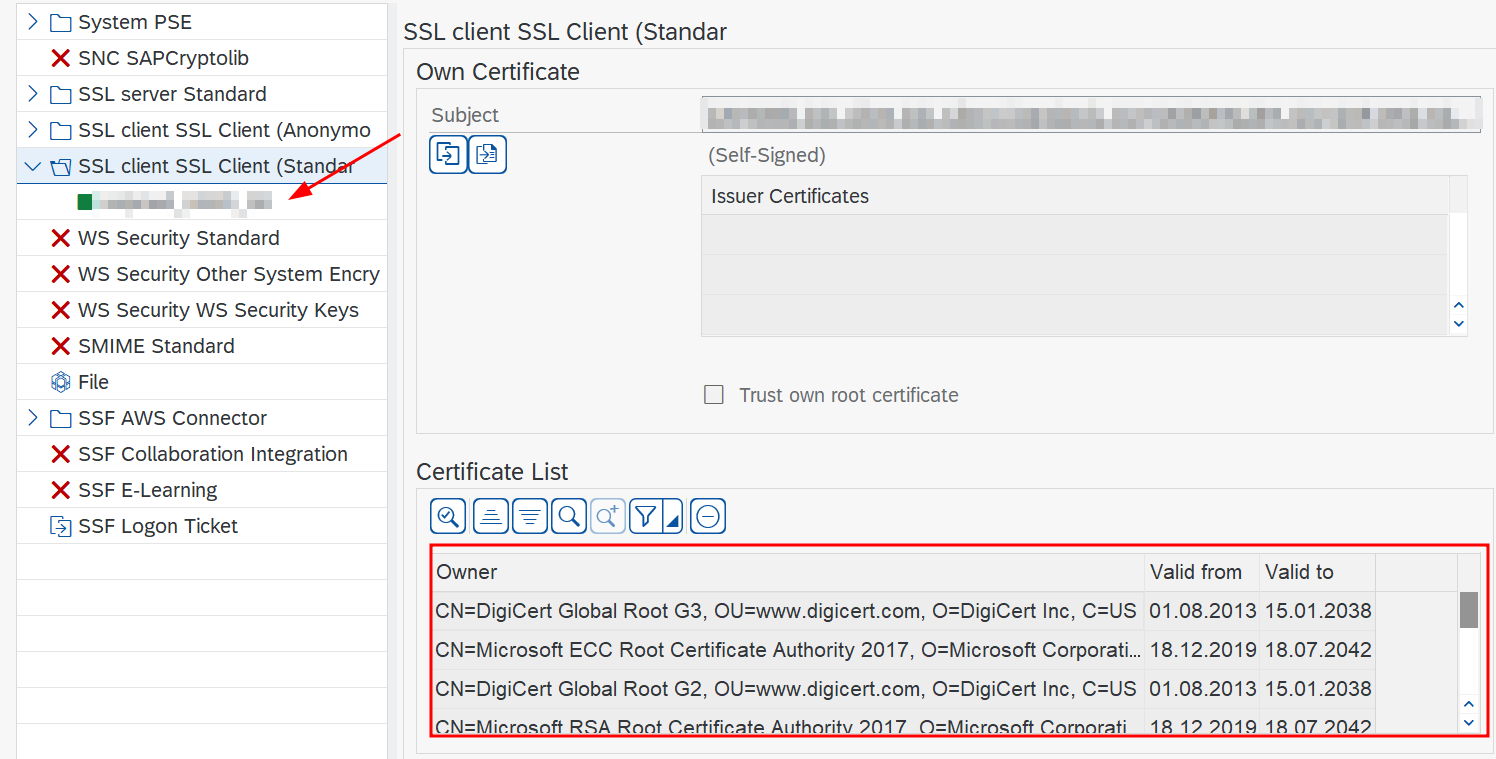SAP Requirements
The following prerequisites for installing Cxlink Smartstore are applicable for SAP Systems hosted in the cloud or on-premise.
Topics
SAP software version requirements
Depending on the CxLink Smartstore product that you are planning to use, the following SAP versions are supported:
| Product | Platform | SAP Version |
|---|---|---|
| Cxlink for Archivelink | SAP S/4HANA | SAP S/4HANA 1909 and above |
| SAP Netweaver | SAP Netweaver 700 and above | |
| Cxlink for ILM | SAP S/4HANA | SAP S/4HANA 1909 and above |
| SAP ECC | SAP ERP 6.0 EHP6 and above | |
| Cxlink Data Lakes | SAP S/4HANA | SAP S/4HANA 1909 or above |
| SAP Netweaver | DMIS version 2011 SP15 or higher installed |
SAP Kernel requirements
CxLink Smartstore, rely on the SAP kernel for its cryptographic, HTTP, XML, and JSON capabilities. We recommend using the latest kernel release that is compatible with your SAP S/4HANA and SAP NetWeaver platform.
_10SAP Kernel release 720 or higher
Ensure also that the SAP Cryptographic Library is updated to the latest version.
_10CommonCryptoLib 8.4.49 or higher
You can find your CommomCryptoLib version from the STRUST transaction, selecting menu option Environment -> Display SSF Version.
SAP Note 1848999 - Central Note for CommonCryptoLib 8 (SAPCRYPTOLIB)
SAP SAINT/SPAM version
Before starting with the addon installation ensure that you meet the following requirements:
- You have SAINT/SPAM SP58 or higher installed in your server
SAP Profile parameters
Ensure secure communication between the system and external or internal clients and servers from your SAP Server by adding the following parameters in the DEFAULT.PFL or Instance Profile,
_10ssl/ciphersuites = 135:PFS:HIGH::EC_P256:EC_HIGH_10ssl/client_ciphersuites = 150:PFS:HIGH::EC_P256:EC_HIGH_10icm/HTTPS/client_sni_enabled = TRUE_10ssl/client_sni_enabled = TRUE
SAP Internet Communication Manager (ICM)
Ensure that both Internet Communication Manager (ICM) HTTP and HTTPS services are defined and running. You can use the below values as example to configure:
_10icm/server_port_0 = PROT=HTTP,PORT=5$(SAPSYSTEM)00,TIMEOUT=600,PROCTIMEOUT=600 _10icm/server_port_1 = PROT=SMTP,PORT=25$(SAPSYSTEM),TIMEOUT=120,PROCTIMEOUT=120_10icm/server_port_2 = PROT=HTTPS,PORT=5$(SAPSYSTEM)01,TIMEOUT=600,PROCTIMEOUT=600
Additional Information can be found in https://help.sap.com/docs/SAP_NETWEAVER_AS_ABAP_FOR_SOH_740/9b04fcf34bff4d2594f653d14637e25d/260b9a6a21ae46b69b897b700301daaf.html
Ensure outbound connectivity
For Cxlink Smartstore to be able to interact with the needed Cloud Services you will need to ensure that your server can reach the proper endpoints.
- Ensure that your server is able to reach the cloud endpoints for the region that you plan to use.
- For your SAP host system, confirm that the firewall rules and proxies allow HTTPS connection to AWS, IBM Cloud or Azure.
Import SSL certificates for HTTPS connectivity
As part of CxLink Smartstore implementation, as in any SAP Netweaver based server, there is a requirement to establish SSL (Secure Sockets Layer) security for an ABAP-based system that requires secure, encrypted communications. SSL (Secure Sockets Layer) is a communication method whereby secure communication between system entities is accomplished by the use of encryption facilitated by X.509 certificates published by Certificate Authorities (CA) in tandem with public and private decryption keys.
Download and install the proper certificates into STRUST transaction.
Cxlink Smartstore can manage the certificate download for you if wget and openssl are installed in your server.
Check the Set up SSL certificates section in Post Processing Steps
For Amazon Web Services and IBM Cloud
- Go to https://www.amazontrust.com/repository/.
- Under Root CAs, download all the certificates using the PEM link.
- Import these certificates in STRUST of your SSL Client (Standard) PSE on each of your SAP systems,as shown in the following image.1

- Remember to Save once all certificates are uploaded.
For Microsoft Azure
- Go to https://www.microsoft.com/pkiops/docs/repository.htm
- Under Certificates and CRLs, download all Root certificates using the CRT link.
- Ensure you download the DigiCert Global Root G2 and DigiCert Global Root G3 from https://www.digicert.com/kb/digicert-root-certificates.htm.
- Import these certificates in STRUST of your SSL Client (Standard) PSE on each of your SAP systems,as shown in the following image.1

- Remember to Save once all certificates are uploaded.